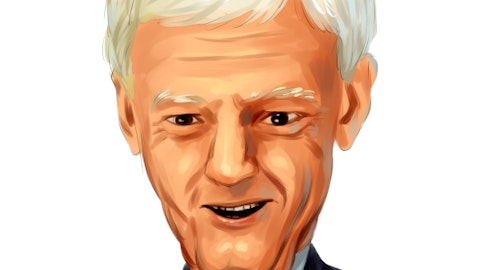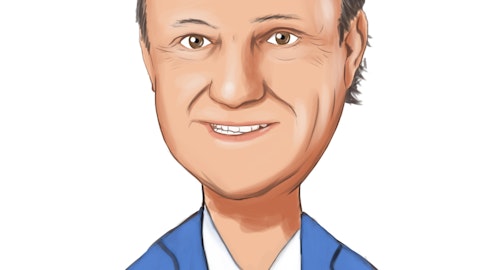Paul Raymond: Yeah, good morning, Vince. Great question. So the contract the way it’s structured is really a minimum. So the organizations in question have significant IT spends way above the minimum commitment. So yes, there’s potential there for it to do a lot more. And as you know, those two organizations are going through integrations and a significant change. So again, whenever that happens, there are significant opportunities for investments and technology and digital transformation. So, yes we are
Claude Thibault: They are major shareholders of Alithya, so they have a vested interest in ending business our way in addition to the contract.
Vincent Colicchio: And curious about — I know you do price increases in January, how are those flow through, whether they meet your expectations?
Paul Raymond: Yeah, our prices increase throughout the year, depending on the date of contract renewals, some are January, some are later in the year. We also price that into all of our new contracts. And, the whole market is aware. I mean, our customers have the same challenges we have in recruiting, in marketing, and in marking salaries to market. So it hasn’t been an issue so far. We’ve been able to price them the increases as they follow the market. Also, a big chunk of our business now is project driven. So within those projects we have more flexibility in how we deliver and how we price and how we structure the delivery of the project. Again, leveraging smart-shoring and then near-shoring and all these things to give us more flexibility in the margins on the projects.
Vincent Colicchio: And one more if I could, I noticed the fixed fee revenue contribution declined sequentially. Is that just ebb and flow and should we expect that to start to recover again going forward?
Claude Thibault: Yeah, it is just ebb and flow, Vince.
Vincent Colicchio: Okay. Thank you. Nice quarter.
Paul Raymond: Thank you.
Operator: Your next question comes from Deepak Kaushal from BMO Capital Markets. Please go ahead.
Deepak Kaushal: Hi, good morning, guys. Can you hear me okay?
Paul Raymond: Yeah, good morning, Deepak.
Deepak Kaushal: Hey, thank you. Just exceptionally strong cash from ops. I’m just wondering if you could give some more color on the nature of that capital reversal. Seems like a lot of it’s from a reversal on unbilled revenue. Is that a specific contract, is that related to R3D, and will you continue to see that kind of seasonality in cash from ops?
Paul Raymond: Yeah, I’m not sure. It wasn’t very clear Deepak. Can you repeat the question?
Deepak Kaushal: Sorry, I think I’m having an issue with my headset. Hang on. I’ll just pick up.
Paul Raymond: All right.
Deepak Kaushal: Hello, can you?
Paul Raymond: Yeah, we can hear you. We just missed the beginning of your question.
Deepak Kaushal: Yeah, just very strong cash for ops. I’m just wondering on the nature of the working capital reversal. It looks like it’s coming from unbilled revenue. Is that contract specific, can you give us some more details on how that came about and will your cash flow cycle going forward always be that seasonal or that volatile?
Paul Raymond: Oh, the anomaly was more at the end of Q2. We had seen the amount of unbilled revenues increasing. It was more a matter of internal setup. It has a lot to do with what day of the week, the end of the quarter falls sometimes and yes, we had a couple of projects that push that up. So the anomaly was there, the amount at the end of Q3 is more indicative of our future quarters. So no, you should not expect a big reversal of that positive we got in Q3.
Deepak Kaushal: Okay, okay, fantastic. And then just stepping back, seeing your solid organic growth, your gross margin shifts, your operating leverage coming back. When I think at a high level of the mix of your business, can you talk a little bit about what percent is recurring, but how that breaks down between project versus managed services, versus IP based and how you might expect that to evolve going forward, are you seeing managed services becoming a bigger and bigger part of your business as you go forward?




